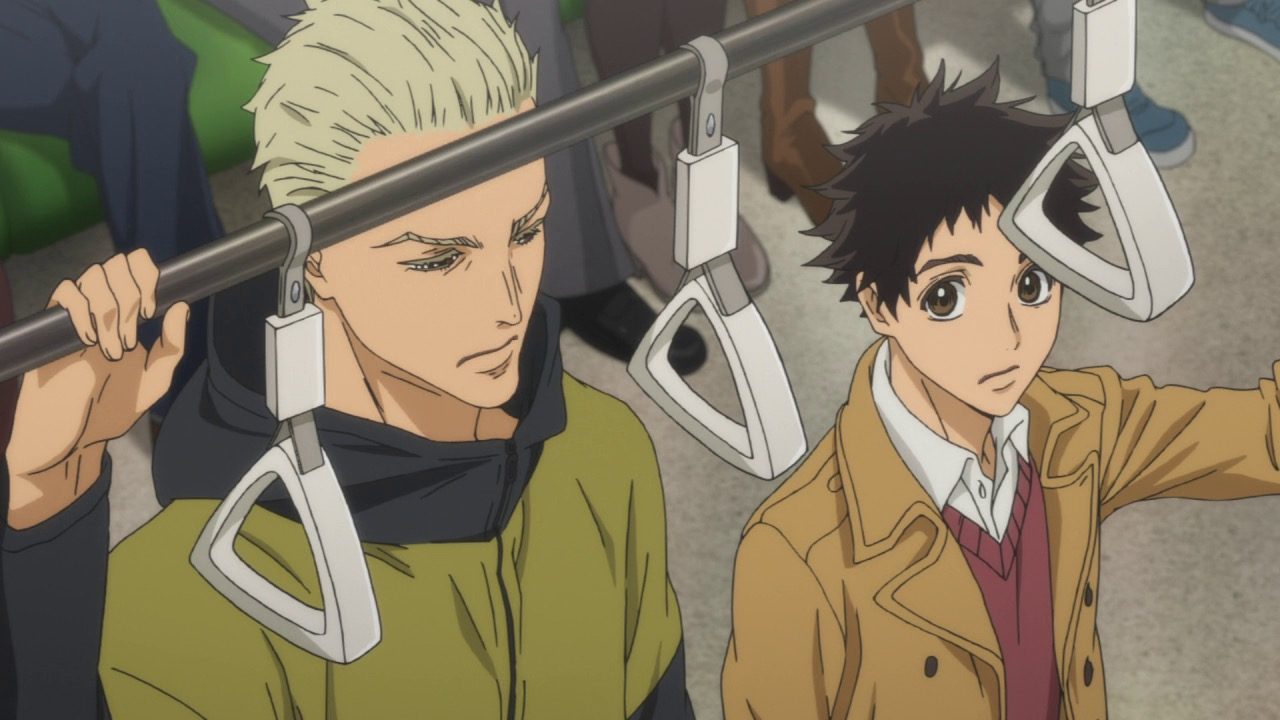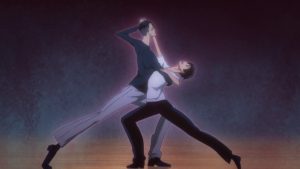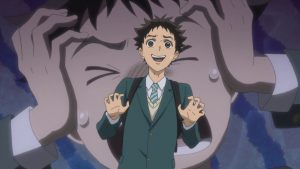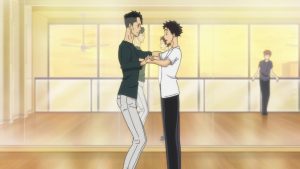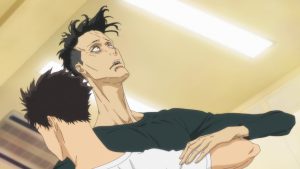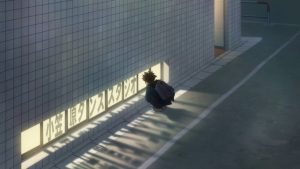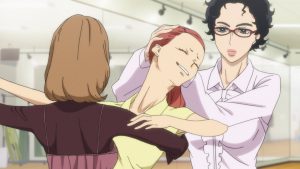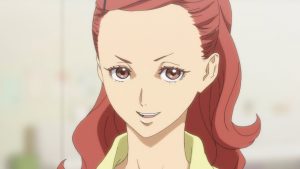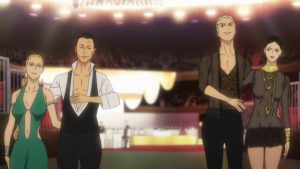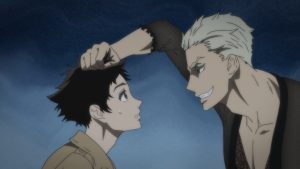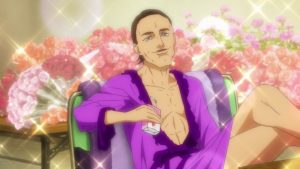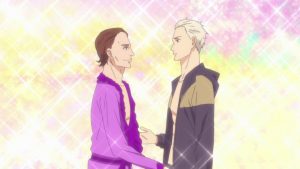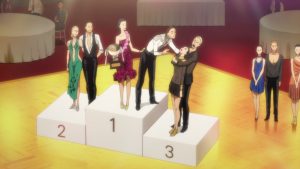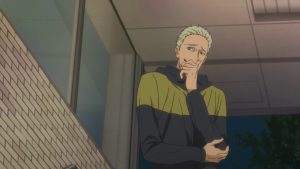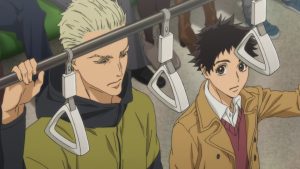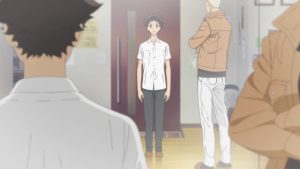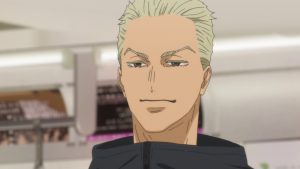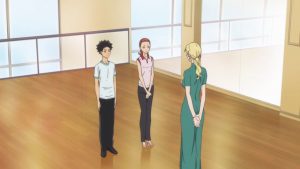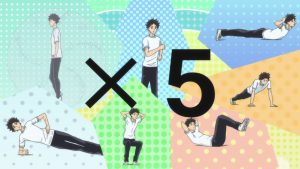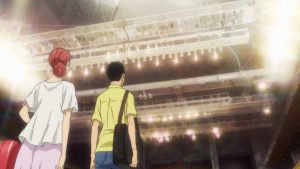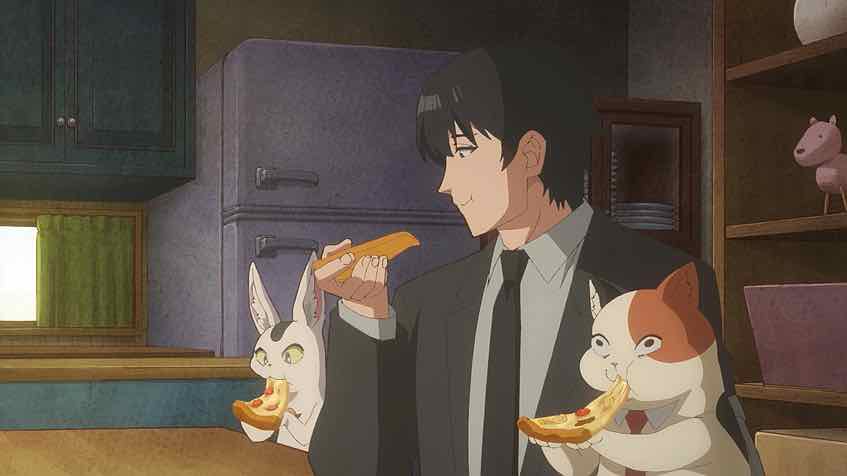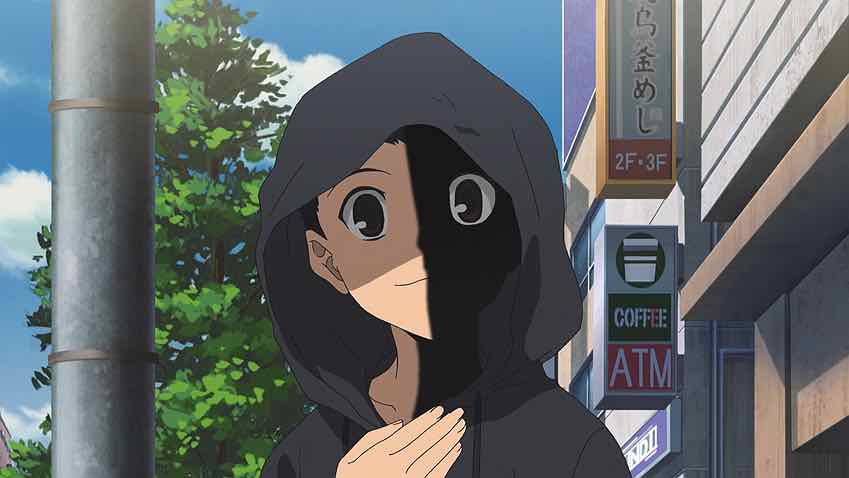 One of the things I notice as we get deeper into Ballroom e Youkoso is the surprising extent to which it’s a creature of shounen habit. That’s both a good and bad thing, depending on which which tropes are in ascendancy in any given moment – but more so than when it began, I realize this is a very traditional sports shounen. We’ve had a number of sports anime in the last few years which take on unusual topics – karuta, kabuki, etc. – but I think Welcome to the Ballroom may be the most loyal to the basic form and structure of the genre.
One of the things I notice as we get deeper into Ballroom e Youkoso is the surprising extent to which it’s a creature of shounen habit. That’s both a good and bad thing, depending on which which tropes are in ascendancy in any given moment – but more so than when it began, I realize this is a very traditional sports shounen. We’ve had a number of sports anime in the last few years which take on unusual topics – karuta, kabuki, etc. – but I think Welcome to the Ballroom may be the most loyal to the basic form and structure of the genre.
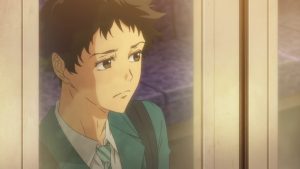 I’ve also been surprised by the extent to which the gender politics of ballroom dancing have become a front-burner theme in “Ballroom”. By its very nature this sport invited such exploration but for a while there, it looked as if it was largely going to get superficial treatment. That’s not the case now, though, as trying to decide what the roles of the boy and girl should be is very much central to Tatara’s development as a dancer. He and Chinatsu did finish second in their novice competition and make the vital jump to D-Class, but the dysfunction of their partnership is not lost on either of them. So much so that Tatara decides to take some time practicing seperately – I think both to clear his head and to tackle his own perceived deficiencies with fewer distractions.
I’ve also been surprised by the extent to which the gender politics of ballroom dancing have become a front-burner theme in “Ballroom”. By its very nature this sport invited such exploration but for a while there, it looked as if it was largely going to get superficial treatment. That’s not the case now, though, as trying to decide what the roles of the boy and girl should be is very much central to Tatara’s development as a dancer. He and Chinatsu did finish second in their novice competition and make the vital jump to D-Class, but the dysfunction of their partnership is not lost on either of them. So much so that Tatara decides to take some time practicing seperately – I think both to clear his head and to tackle his own perceived deficiencies with fewer distractions.
 In order to pursue this goal, Tatara-kun seeks out Kiyoharu’s help – ultimately his mother Marisa’s help, in fact. Her “sly” comment clearly got under his skin, and Tatara longs to understand what it means, exactly. Again, this is where the subtleties of competitive dance are a bit of a mystery. Is Tatara “wrong” in believing a partnership should be just that, a partnership? It seems like such a common-sensical and progressive notion but as Marisa-san reminds him in no uncertain terms, in the eyes of the sport it is wrong. Only the male is listed on the form as an “athlete”, and the partner is basically not even looked at by the judges until the finals. In truth, only one of the couple is actually a “partner”, and that’s the female – the other is the leader. That’s not what we think of as partnership in the muggle world, but that’s dance.
In order to pursue this goal, Tatara-kun seeks out Kiyoharu’s help – ultimately his mother Marisa’s help, in fact. Her “sly” comment clearly got under his skin, and Tatara longs to understand what it means, exactly. Again, this is where the subtleties of competitive dance are a bit of a mystery. Is Tatara “wrong” in believing a partnership should be just that, a partnership? It seems like such a common-sensical and progressive notion but as Marisa-san reminds him in no uncertain terms, in the eyes of the sport it is wrong. Only the male is listed on the form as an “athlete”, and the partner is basically not even looked at by the judges until the finals. In truth, only one of the couple is actually a “partner”, and that’s the female – the other is the leader. That’s not what we think of as partnership in the muggle world, but that’s dance.
 To emphaisze this disconnect, we meet the man who won the novice competition last week – Kugimiya Masami (Sakurai Takahiro – always a pleasure to have him do his Cat Sidhe voice). He’s one of Marisa’s students and only a “novice” only because he’d missed time with an injury. Kiyoharu describes him as the “opposite type” of leader from Tatara, and he’s just that both in terms of style and substance. Tatara-kun clearly dislikes what Kugimiya represents, and when Marisa pairs them off for a practice run, while he gets a taste of Kugimiya’s assertive skill as a leader, in no way does it strike Tatara as something he wants to emulate himself.
To emphaisze this disconnect, we meet the man who won the novice competition last week – Kugimiya Masami (Sakurai Takahiro – always a pleasure to have him do his Cat Sidhe voice). He’s one of Marisa’s students and only a “novice” only because he’d missed time with an injury. Kiyoharu describes him as the “opposite type” of leader from Tatara, and he’s just that both in terms of style and substance. Tatara-kun clearly dislikes what Kugimiya represents, and when Marisa pairs them off for a practice run, while he gets a taste of Kugimiya’s assertive skill as a leader, in no way does it strike Tatara as something he wants to emulate himself.
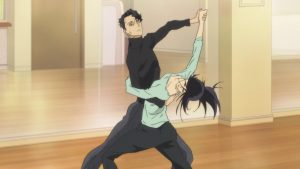 Sengoku’s return for the Japan Open (one of the largest competitions in Japan, held at the Budokan in Tokyo), allows Ballroom e Youkoso to show off one of shounen’s rather less appealing tendencies. This is a true international competition, including top dancers from places like Europe – and the winner is former world champ Vassily Trucachev (Sengoku places 3rd, revealing both how far above other Japanese dancers he is, and how far Japan still has to go to catch up to the world). The encounter with Trucachev after the competition has the stench of juvenile homophobia to it, all too common in shounen still, even if less so than a decade or two ago. It’s not Ballroom’s finest moment to say the least, and best quickly forgotten in hopes it won’t be repeated.
Sengoku’s return for the Japan Open (one of the largest competitions in Japan, held at the Budokan in Tokyo), allows Ballroom e Youkoso to show off one of shounen’s rather less appealing tendencies. This is a true international competition, including top dancers from places like Europe – and the winner is former world champ Vassily Trucachev (Sengoku places 3rd, revealing both how far above other Japanese dancers he is, and how far Japan still has to go to catch up to the world). The encounter with Trucachev after the competition has the stench of juvenile homophobia to it, all too common in shounen still, even if less so than a decade or two ago. It’s not Ballroom’s finest moment to say the least, and best quickly forgotten in hopes it won’t be repeated.
 Ironically the best moment of the episode comes on the heels of that misstep, as Tatara joins Sengoku on the trip home from the Budokan. Here he reveals that he’s going to join the Hyodo Dance Academy, which of course means leaving the Ogasawara studio. This makes perfect sense, for all the reasons Tatara points out (and which Tamaki-san herself asserted to him). Sengoku is a full-time competitor who travels the world and doesn’t really have the time to teach (and he’s a lousy teacher anyway, if we’re honest), and Ogasawara isn’t really equipped to handle students with top-line aspirations. But the emotional side is still hard – Sengoku was an aniki figure to Tatara in his brusque way, and Ogasawara took him in basically for free. This was a split that probably had to happen, but that doesn’t mean there’s no pain involved.
Ironically the best moment of the episode comes on the heels of that misstep, as Tatara joins Sengoku on the trip home from the Budokan. Here he reveals that he’s going to join the Hyodo Dance Academy, which of course means leaving the Ogasawara studio. This makes perfect sense, for all the reasons Tatara points out (and which Tamaki-san herself asserted to him). Sengoku is a full-time competitor who travels the world and doesn’t really have the time to teach (and he’s a lousy teacher anyway, if we’re honest), and Ogasawara isn’t really equipped to handle students with top-line aspirations. But the emotional side is still hard – Sengoku was an aniki figure to Tatara in his brusque way, and Ogasawara took him in basically for free. This was a split that probably had to happen, but that doesn’t mean there’s no pain involved.
 I suspect there will be pain involved in Tatara and Chinatsu’s trip to Shizuoka, too. Tatara has signed them up for a Grand Prix event without telling Marisa-sensei (and indeed, against her direct advice and instruction). Tatara is understandably impatient to start keeping what he sees as a promise with both Kiyoharu-kun and Shizuku-san, but he and Chinatsu are clearly not ready for this – and I suspect those more experienced dancers at the Grand Prix are going to lay a world of hurt on the pair of them. The question isn’t so much the likely result, but whether that sort of result will end up helping or hurting Tatara’s development as a leader, and their development as a couple.
I suspect there will be pain involved in Tatara and Chinatsu’s trip to Shizuoka, too. Tatara has signed them up for a Grand Prix event without telling Marisa-sensei (and indeed, against her direct advice and instruction). Tatara is understandably impatient to start keeping what he sees as a promise with both Kiyoharu-kun and Shizuku-san, but he and Chinatsu are clearly not ready for this – and I suspect those more experienced dancers at the Grand Prix are going to lay a world of hurt on the pair of them. The question isn’t so much the likely result, but whether that sort of result will end up helping or hurting Tatara’s development as a leader, and their development as a couple.


